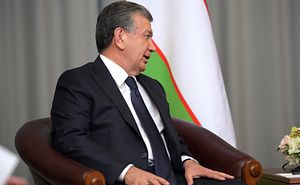In an unprecedented move in January 2018, Uzbek President Shavkat Mirziyoyev removed the long-serving, and powerful head of the National Security Service (SNB), Rustam Inoyatov. Given the SNB’s infamous reputation as a repressive secret police – although it was only meant to be an intelligence agency – Inoyatov’s removal potentially represents the most ambitious reform move made by Mirziyoyev since he assumed the presidency in September 2016, after the death of Uzbekistan’s longtime ruler, Islam Karimov. However, it would be premature to assume that this move symbolizes a significant shift towards the liberalization of the political and security landscape.
After the death of Karimov, Inoyatov, dubbed the “gray cardinal” and once considered Karimov’s successor, emerged as the kingmaker. Inoyatov allegedly played a key role behind Mirziyoyev’s ascendancy, assured in private that the latter would maintain the conservative agenda of Karimov’s authoritarian regime. Mirziyoyev fitted the bill perfectly. Prime minister since 2003, and before that, regional governor of Jizzakh and Samarkand provinces, Mirziyoyev was deemed to be a strongman leader like Karimov. Responsible for Uzbekistan’s cotton harvest, Mirziyoyev oversaw the annual mobilization of hundreds of thousands of forced laborers. Mirziyoyev has been described as “the same kind of ruler as Islam Karimov, maybe even tougher”.
Once in power, Mirziyoyev modeled his leadership style as that of a reformer, and introduced limited reforms in the political, socioeconomic and foreign policy spheres. For example, in September 2017, the government lifted restrictions on exchanging foreign currency, largely eliminating a black market controlled by the SNB and making it easier for foreign companies to invest. On December 7, Mirziyoyev pardoned 2,700 political prisoners, although thousands more remain behind bars. On the foreign policy front, Uzbekistan has sought to reduce tensions with Tajikistan and Kyrgyzstan over water-sharing and border demarcation disputes, while courting Afghanistan for enhanced trade and security cooperation.
However, it is the removal of Inoyatov that has prompted many observers to ask whether significant, positive changes are underway in the country, primarily due to Inoyatov’s powerful status within the security establishment and opposition to reforms. As the leader of the SNB for more than two decades, Inoyatov was implicated in several high-profile incidents, including allegedly persuading Karimov to imprison his own nephew in a psychiatric clinic, prosecute his daughter on extortion charges, as well as the attempted assassination of Karimov in the 1999 Tashkent bombings and the assassination of a Kyrgyz reporter in 2007.
Mirziyoyev’s office justified the surprise move by saying that Inoyatov had been appointed a security adviser to the President and a member of the Senate. However, the decision likely represents a consolidation of Mirziyoyev’s power, and to a lesser extent, a commitment to reforms, although the two issues are partially interrelated.
Prior to becoming president, Mirziyoyev allegedly made an informal power-sharing deal with Inoyatov and then-Deputy Prime Minister Rustam Azimov. Nevertheless, after coming to power, Mirziyoyev demoted Azimov, leaving him with his minister of finance title, and fired him from that post as well a few months later. He fired several Inoyatov loyalists in the SNB and other security agencies, and moved certain security units from the SNB’s control to the ministry of the interior. In September 2017, Mirziyoyev appointed two allies as defense and interior ministers. Moreover, several former officials imprisoned for corruption were released, including former Tashkent mayor, Kozim Tulaganov, who was appointed head of the state construction committee by Mirziyoyev. Removing Inoyatov was arguably the most significant move; he was replaced by a loyalist in the form of Abdullayev Ihtiyor.
While the purging of rivals and promotion of allies strengthens Mirziyoyev’s grip on power, these moves could also indicate a real commitment to reform. Inoyatov and the SNB have allegedly been the main obstacles to Mirziyoyev’s wider reform efforts. Even during Karimov’s rule, the SNB was frequently been accused of overstepping its mandate, leading some commentators to speculate that Karimov’s control over Inoyatov and security agencies was beginning to slip. Before his death, Karimov criticized the secret police for extrajudicial killings, following the arrest of a SNB lieutenant for the murder and beheading of a local businessman. Since becoming president, Mirziyoyev echoed similar sentiments, accusing the SNB of committing atrocities and “exceeding its authority,” while vowing that the agency’s “time is up.”
With Inoyatov removed from the SNB and other rivals sidelined, Mirziyoyev finds himself at a crossroads, with nearly unchallenged power to shape and dictate the future of Uzbekistan. Mirziyoyev has the opportunity to use the removal of Inoyatov as a catalyst to further liberalize the political system, or commit to simple democratic window dressing for a repackaged authoritarian regime with himself at the helm.
Up until now, Mirziyoyev has given little indication that his vision for Uzbekistan includes genuine political pluralism, a free media environment, or the protection of basic human rights. For example, the arrest of Bobomurod Abdullaev, an independent journalist, and Nurullo Raufkhon, an Uzbek author, in late September 2017 indicate that despite progressive rhetoric, the security forces continue to wrongfully detain journalist and political dissidents. Thus, despite Mirziyoyev’s public pronouncements to distance himself from the atrocities of his predecessor, Uzbekistan largely remains in the shadows of Karimov’s authoritarian reign.
Tim Geschwindt is a Risk and Security Analyst with a focus on Russia and Commonwealth of Independent States at S-RM Risk Consulting.

































